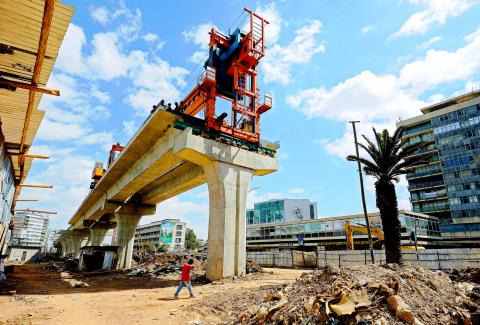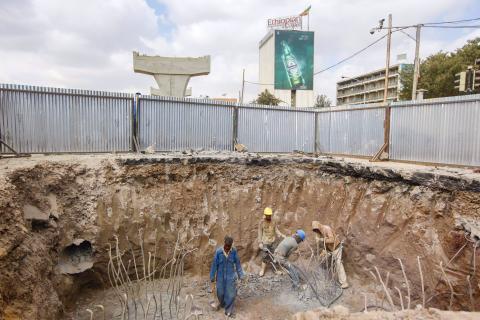A bove Addis Ababa’s concrete skyline, cranes tower high amid blasts from nearby drills and diggers. At the feet of buildings shrouded in bamboo scaffolding, excavators dig up dirt tracks, to be replaced by paved roads and a modern railway.
It is a scene common to most neighborhoods in the Ethiopian capital, which has turned into a giant building zone as it undergoes a transformation.
“It looks like a construction site when we compare from the previous time,” said Berhanu Kassa, manager of B.B. Construction in the booming city.

Photo: AFP
“Especially in the past five years, it’s a really big change,” he added, speaking at the site of his latest project, a mixed-use commercial building on one of the city’s main thoroughfares.
Addis Ababa’s construction boom — funded both from private and public coffers — is being driven by the country’s recent rapid economic growth.
However, the government hopes it will attract further investment and help industrialize the economy so Ethiopia can reach middle-income status by 2025.

Photo: EPA
The public works projects, worth billions of dollars, include new roads, railways and massive power generation schemes across the country.
Meanwhile, the majority of new buildings are owned by private investors, who by law must be Ethiopian citizens. The development promises to boost economic growth, which was officially 9.7 percent last year, although the IMF pegs it at closer to 7 percent.
“The basic engine blocks of economic transformation are the infrastructure,” Ernst & Young Ethiopia managing partner Zemedeneh Negatu said. “The Achilles heel of Africa is power — lack of power, lack of road networks, lack of the basic needs that you need to transform your economy.”
Yet analysts say the construction boom is also a symptom of the financial system’s weakness, which leaves the business community with few investment opportunities outside of the sector.
“This is the most attractive investment opportunity in the country for the time being since we do not have a financial market that is working properly,” said Jan Mikkelsen, head of the IMF’s mission in Ethiopia.
“There’s no financial markets, no stock exchange, so real estate investments seem to be the most attractive from that point of view,” Mikkelsen added.
The majority of the new buildings are hotels, apartments and offices, most of which are being built by Ethiopian-owned construction firms, although foreign-owned contractors from China or Turkey are cashing in too.
The government said the big push in the sector — which is bolstered by state-led incentives such as tax breaks and ready access to land — is driven by the need to create jobs for Ethiopia’s 91 million people, about one in four of whom are unemployed.
“We are struggling to eradicate poverty and create jobs,” State Minister for Urban Development and Construction Desalegne Ambaw said.
Officials say 4 million jobs were created in the past three years, including an increase in construction sector employment. Yet Mikkelsen warns that resources should not be pooled too heavily into infrastructure projects, no matter how crucial.
“There is a need for construction, but of course there’s a limit to how much you can get out of that and these are potential resources that could have been used for other means and maybe more export-oriented businesses as well, given that there is an urgent need for more foreign exchange,” he said.
Imports outweigh exports by a factor of four, according to IMF data, which starves the country of foreign exchange.
The ambitious state-funded infrastructure projects also threaten to strain public finances. IMF forecasts see the public deficit possibly swelling to 44 percent of GDP within several years, nearly double the current level that means the country is borrowing one-fifth of what it spends.
As it is, the financing shortfall for public works projects is already 10 percent of GDP, but for now, Berhanu said he is grateful for the government’s focus on the construction sector, since his business is booming.
“From a business perspective we are busy, sometimes it is even beyond our capacity,” he said, adding that his company has grown from three people to more than 300 over the past 20 years.
Berhanu said Ethiopia’s economic growth is fueling the expansion of his business by creating a demand for new infrastructure and that he in turn, is contributing to this by creating employment and supporting local industries.
“I hire a lot of workers here, I use a lot of local materials, I use a lot of subcontractors and because of that all we grow together and the country benefits,” he said.
Zemedeneh is confident the city will continue to attract foreign investors and that he expects its transformation to continue.
“The bottom line is you will not recognize Addis if you come 10 years from now, it will be a completely, completely different city,” he said.

Intel Corp chief executive officer Lip-Bu Tan (陳立武) is expected to meet with Taiwanese suppliers next month in conjunction with the opening of the Computex Taipei trade show, supply chain sources said on Monday. The visit, the first for Tan to Taiwan since assuming his new post last month, would be aimed at enhancing Intel’s ties with suppliers in Taiwan as he attempts to help turn around the struggling US chipmaker, the sources said. Tan is to hold a banquet to celebrate Intel’s 40-year presence in Taiwan before Computex opens on May 20 and invite dozens of Taiwanese suppliers to exchange views

Application-specific integrated circuit designer Faraday Technology Corp (智原) yesterday said that although revenue this quarter would decline 30 percent from last quarter, it retained its full-year forecast of revenue growth of 100 percent. The company attributed the quarterly drop to a slowdown in customers’ production of chips using Faraday’s advanced packaging technology. The company is still confident about its revenue growth this year, given its strong “design-win” — or the projects it won to help customers design their chips, Faraday president Steve Wang (王國雍) told an online earnings conference. “The design-win this year is better than we expected. We believe we will win

Chizuko Kimura has become the first female sushi chef in the world to win a Michelin star, fulfilling a promise she made to her dying husband to continue his legacy. The 54-year-old Japanese chef regained the Michelin star her late husband, Shunei Kimura, won three years ago for their Sushi Shunei restaurant in Paris. For Shunei Kimura, the star was a dream come true. However, the joy was short-lived. He died from cancer just three months later in June 2022. He was 65. The following year, the restaurant in the heart of Montmartre lost its star rating. Chizuko Kimura insisted that the new star is still down

While China’s leaders use their economic and political might to fight US President Donald Trump’s trade war “to the end,” its army of social media soldiers are embarking on a more humorous campaign online. Trump’s tariff blitz has seen Washington and Beijing impose eye-watering duties on imports from the other, fanning a standoff between the economic superpowers that has sparked global recession fears and sent markets into a tailspin. Trump says his policy is a response to years of being “ripped off” by other countries and aims to bring manufacturing to the US, forcing companies to employ US workers. However, China’s online warriors